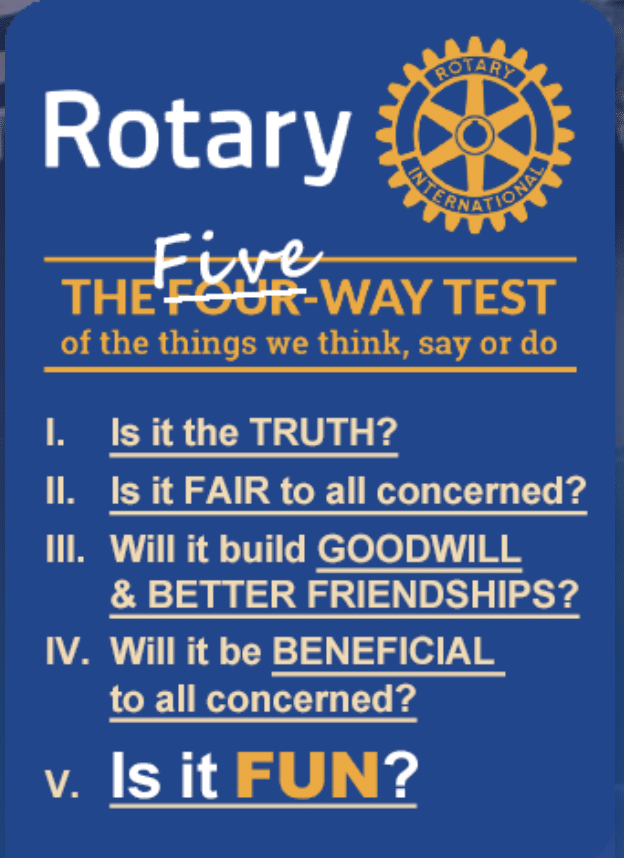
4-Way Test
District #5630 Four-Way Test Essay Contest
The District 5630 Four-Way Test Essay Contest begins at the Rotary Club level where each club can have their contest with sixth graders in their community. Find a sixth-grade teacher who is willing to work with you and then have his/her students write essays using the following rules.
The winning essay of each local contest must be to the District 5630 Chair by a designated date for the district winner to be chosen and announced at a district event. This is an easy, fun way to get the name of Rotary out into the community and to teach young people about our ideals.
The necessary forms for this contest can be found on the bottom of this page.
Official topic:
How Can I Apply the Four-Way Test to My Life?
- Participants must write on the official contest topic.
- At the top of page 1 should be the official topic and number of words.
- Each essay must be 200-500 words in length, typed and double-spaced.
- Each page of the essay must be numbered starting with page 1.
- No reference can be made in the essay that identifies the student or family.
- Student name must be on the Four-Way Test Entry Form only
- Attach one Four-Way Test Entry Form to each essay.

Judging Criteria
Judging will be completed by a panel of three qualified judges unfamiliar with the contestants.
To conceal the identity of each contestant, each entry will be assigned a number by the Essay Contest Chair. The assigned number will be placed on the Four-Way Test Entry Form and page 1 of the essay. The Four-Way Test Entry Form will then be detached and retained by the Essay Contest Chair. The judges will be given the essays bearing only the assigned numbers.
Judges will not discuss or compare essays being judged.
Only judges can assign a penalty or award points.
Entries will be judged on the following criteria:
Material Organization
- the interpretation of the subject
- a clear presentation of the writer’s concept
- dedication to research
- the logical organization of the supporting facts should be considered.
The maximum point award is 60 points.
Vocabulary and Style
- The choice of words
- use of descriptive phrases
- clear sentence structure
- illustration of the topic is considered.
The maximum point award is 30 points.
Grammar, Punctuation, and Spelling
- Consider such factors as subject and verb agreement
- plurals of nouns
- verb tense
- punctuation and capitalizing
The maximum point award is 10 points.

History of the
4-Way Test
Herbert J. Taylor, a Chicago Rotarian and president of Rotary International conceived the Four-Way Test. In 1932, the company's creditors assigned Taylor the task of rescuing an all-but-bankrupt aluminum cookware company.
Looking at the situation of the company and its competitors, Taylor decided that the only avenue in which the company could compete with others was in character, dependability, and service-mindedness of company personnel. He felt the company needed a simple measuring stick of ethics that everyone in the company could use. In July 1932, after careful consideration, Taylor penned,
“The Four-Way Test: Of the things we think, say or do…”
- Is it the truth?
- Is it fair to all concerned?
- Will it build goodwill and better friendships?
- Will it be beneficial to all concerned?
In January 1943, Rotary decided to make the Four-Way Test a part of the Vocational Service ideal. Rotarians have always shown a deep interest in our young people who are the future of our world. Therefore, we invite you to participate in our Essay Contest.
Contact:
Nicole Badgley, sponsor:
Rotarian Code of Conduct
- Act with integrity and high ethical standards in my personal and professional life.
- Deal fairly with others and treat them and their occupations with respect.
- Use my professional skills through Rotary to: mentor young people, help those with special needs, and improve people’s quality of life in my community and in the world.
- Avoid behavior that reflects adversely on Rotary or other Rotarians.
- Help maintain a harassment-free environment in Rotary meetings, events, and activities, report any suspected harassment, and help ensure non-retaliation to those individuals that report harassment.


